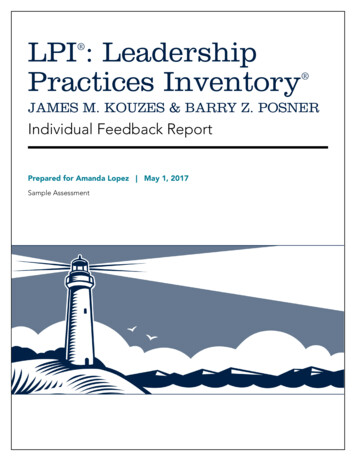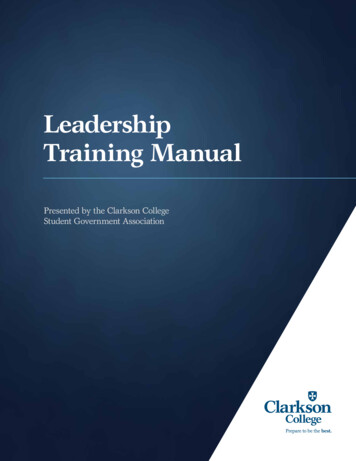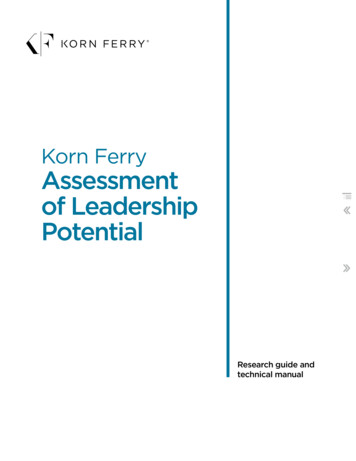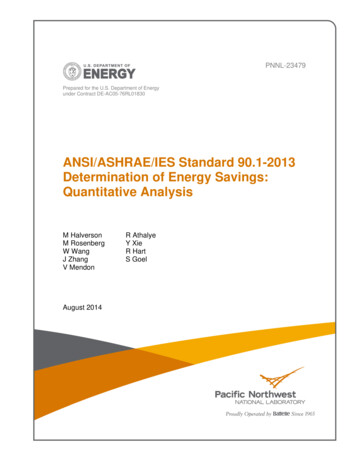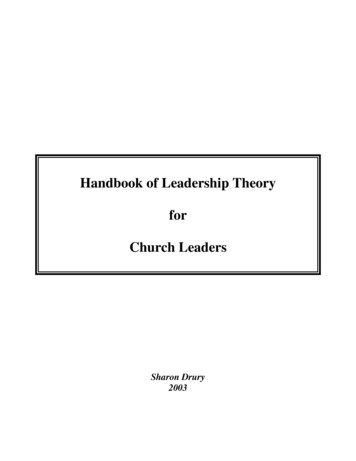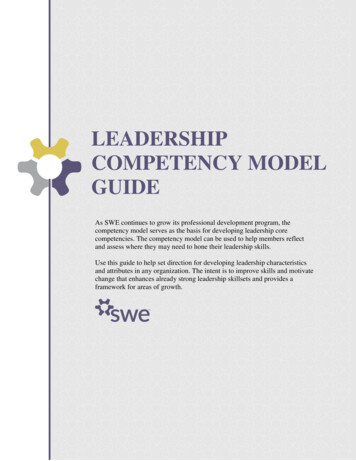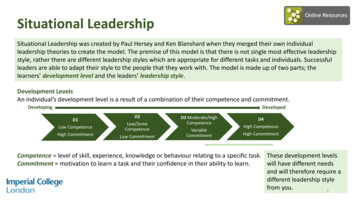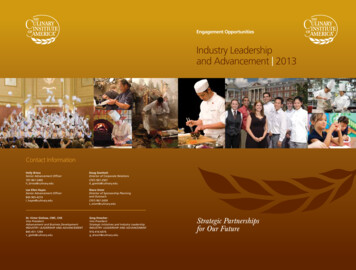
Transcription
Engagement OpportunitiesIndustry Leadershipand Advancement 2013Contact InformationHolly BriwaSenior Advancement Officer707-967-2400h briwa@culinary.eduDoug GoettschDirector of Corporate Relations(707) 967-2507d goetts@culinary.eduLee Ellen HayesSenior Advancement Officer845-905-4274l hayes@culinary.eduShara OremDirector of Sponsorship Planningand Outreach(707) 967-2439s orem@culinary.eduDr. Victor Gielisse, CMC, CHEVice PresidentAdvancement and Business DevelopmentIndustry Leadership and Advancement845-451-1294v gielis@culinary.eduGreg DrescherVice PresidentStrategic Initiatives and Industry LeadershipIndustry Leadership and Advancement916-416-6476g dresch@culinary.eduStrategic Partnershipsfor Our Future
Contents2 The Foundation of CIA Leadership33 Digital Media8 Thought Leadership38 Engagement Opportunities12 At-A-Glance Planning Tools44 Consulting Services18 Annual Leadership Awards45 Career Services20 Leadership Programs46 Our PartnersWelcomeAt The Culinary Institute of America, we believe that food matters. It matters in nearly every facet of ourlives, from sustaining social traditions and communities to enhancing the health of our families. Professionalcooking can be both art and business. It can be about creating memorable flavors for special occasions orfeeding millions of busy people on the run.In all we do—from our degree programs to our industry leadership initiatives—we work to advance the successof our students, our graduates, and our industry to meet the full measure of possibilities in our shared world offood and cooking.Through our Industry Leadership and Advancement Division, the CIA is pioneering new research,international programs, and other initiatives in the critical areas of health and wellness, sustainability, worldcuisines and cultures, and professional excellence and innovation.Our Division is responsible for directing these programs and gaining the institutional support they require, aswell as the support the CIA needs as a whole to secure—each and every day—our reputation as the world’s bestprofessional culinary college.Throughout our history, the CIA has engaged and strategically partnered with a broad range of organizationsto further its mission. Corporations, industry and professional associations, foundations, governments, collegesand universities, and other institutions serve as essential CIA collaborators in helping to grow our industryand advance the role that food and food choices play in society.This support is critical to ensure sufficient scholarship funds for our students. By reducing the financial burdenon our graduates, we help increase the speed and altitude of their climb towards professional success andpositive social impact. It is through scholarships that the CIA meets its responsibility to provide opportunitiesto students with the greatest potential, regardless of financial need.In this publication, you will get a sense of the far-reaching capabilities of the CIA, from our world-renownedconferences to our presence in the rapidly expanding world of digital media to our consulting services. Youwill also learn about our focus on thought leadership: The CIA is growing and evolving to address some ofthe most pressing issues of our time. We know that in addition to educating accomplished chefs who go onto influence all sectors of the industry—from hotels and restaurants to campus dining, corporate foodserviceand the multi-unit sector—we must also lead the discussion and inspire informed action on important foodrelated issues. How can we accelerate menu R&D around healthy, flavorful foods? How can we balance theexpanding global needs for food—as a result of adding two billion people to our planet during the careers ofour newest graduates—with sustainable production practices?Our partnerships with the private and public sectors have been essential to our success. Whether your interestin collaborating with us stems from a desire to invest in the future of our vibrant 630 billion industry, addressa vital social imperative, solve a specific product or menu challenge, or expand market share through strategicinnovation—or all of the above—we look forward to working with you.Hyde Park, NYThe CIA’s main campus rises dramaticallyfrom a high bluff above New York’smagnificent Hudson River Valley.Dr. Victor A.L. Gielisse, CMC, CHEGreg DrescherVice PresidentAdvancement and Business DevelopmentVice PresidentStrategic Initiatives and Industry LeadershipIndustry Leadership and AdvancementIndustry Leadership and Advancement
The Foundation ofCIA LeadershipCIA Alumni:Leading Our IndustryGrant Achatz ’94chef/owner, Alinea, Next, and AviaryFor nearly seven decades, The Culinary Institute of America has been setting the globalstandard for professional culinary education. Excellence, leadership, professionalism,ethics, and respect for diversity are the core values that guide our efforts. We teach ourstudents the general knowledge and specific skills necessary to live successful lives and togrow into positions of influence and leadership in their chosen professions.Engaged Faculty, Students, and AlumniFour Diverse CampusesThe most important ingredient in any college’srecipe for success centers on its faculty, students,staff, and alumni. At The Culinary Institute ofAmerica, our team is world-class. No other culinarycollege can match the breadth and depth ofknowledge offered by our instructors. The topflightfaculty of 150, who hail from 16 countries, bringcultural diversity to our students’ experiences.Student-staffed public restaurants give our aspiringculinarians real-world experience before graduation.World-class conferences, regularly held on ourcampuses, bring together thought leaders andprovide opportunities for student involvement. Andthe CIA’s commitment to Green Campus initiativessets a standard of social responsibility for students toemulate as they enter the workforce.From its humble beginnings in a single buildingin New Haven, CT, the CIA has extended thereach of its gold-standard culinary education toinclude four campus locations in the U.S. andabroad. While each one is unique in its geographicsetting and reflects the culinary culture in which itresides, all four campuses provide the same highquality CIA education. Whether students seeka bachelor’s or associate degree, certificate-leveltraining, or professional development, the CIA hasopportunities for them.The CIA’s diverse student body includes morethan 2,800 degree-program students who comefrom virtually every state and 30 countries.Our students represent a balance of traditional(recent high school graduates) and non-traditional(adult) students. They all share a common goalof becoming accomplished chefs or culinaryprofessionals who will have an impact on theircommunities and who will carry on the powerfultraditions of the CIA. CIA alumni thrive inevery sector of the world of food. They overseerestaurants large and small; they are entrepreneursand leaders in food innovation. CIA graduatesare the daily advocates for the message thatfood matters and that food enriches our lives inimmeasurable ways.2Our Distinctive Not-for-Profit RoleOur 501(c)(3) not-for-profit status distinguishes theCIA from others because it enables us to focus onthe quality of education rather than on satisfyingthe investment expectations of shareholders. Unlikenearly all other culinary schools, the CIA belongsto the world of prestigious colleges and universitiesthat are typically not-for-profit institutions. As such,the college has accreditation through the MiddleStates Commission on Higher Education, whichaccredits leading higher education institutionsthroughout its region. The CIA directs the financialresources it receives right back into its educationmission—providing the best professional culinaryeducation to thousands of students each year in ourdegree and professional development programs.Our 44,000 alumni in foodservice, hospitality, and related fieldshave brought the CIA’s commitment to excellence and passion forwhy and how food matters to every corner of our industry, andbeyond. Our graduates go on to become executive chefs managingteams of cooks, restaurant and business owners, personal chefs,hotel executives, pastry chefs, R&D chefs, vice presidents of culinaryinnovation for major foodservice and manufacturing companies,culinary educators, food writers, media personalities, and successfulentrepreneurs bringing new products and concepts to market. Ourgraduates are everywhere, influencing all sectors or our industry,from Marriott to McDonald’s, Disney to Dunkin’ Brands, and StanfordUniversity Dining to Sodexo Corporate Services.As never before, CIA chefs are at the center of our incredible, interconnected foodworld. They are flavor experts, masters of technique, researchers of world foodtraditions, creative geniuses, and they are in the best position to make healthy foodscraveable. CIA chefs lead operations as small as 40-seat restaurants and as large asthose of major universities. They are launching start-up food companies and advisingmulti-billion dollar corporations on how to up their game on nutrition and foodquality. They design special meals for senior living and support culinary competitionsto drive skill building in the U.S. Armed Forces. Chefs are business leaders,elementary school volunteers, and advocates for the hungry and disadvantaged.What sets CIA graduates apart from the rest? Our graduates are the first choice ofleading foodservice and hospitality industry employers around the globe. The level ofdedication and talent among our graduates is unsurpassed. For these up-and-comingprofessionals, foodservice is much more than a job. It’s a career.Cat Cora ‘95first female Iron Chef,Food Network’s IronChef AmericaTom Gumpel ‘86Director of Researchand Development,Panera BreadCharlie Palmer ‘79chef/owner Aureole,Charlie Palmer Steak,and Dry Creek Kitchen;Vice Chairman,CIA Board of Trustees“My education at The Culinary Institute of America waswithout a doubt the single most important decision of mycareer. With the opening of the CIA San Antonio, so manymore young Hispanic men and women pursuing theirown dreams now have a shot at success and professionalachievement previously unimaginable.”Johnny Hernandez ’89Executive Chef/Owner, La Gloria, Los Portales, San Antonio3
The CIA:Four Campuses,One MissionCIA Hyde ParkThe CIA’s main campus in New York’s scenic Hudson River Valley offerseverything an aspiring or professional culinarian could want. Studentsbenefit from outstanding facilities that include 41 professionally equippedkitchens and bakeshops; four award-winning, student-staffed restaurants;culinary demonstration theaters; a dedicated wine lecture hall; a centerfor the study of Italian food and wine; a library with nearly 84,000volumes; and a storeroom filled with the finest ingredients, includingmany sourced from the bounty of the Hudson Valley.The CIA is the recognized leader in culinaryeducation for undergraduate students, foodserviceand hospitality professionals, and food enthusiasts.Throughout its history, the college has played apivotal role in shaping the future of foodservice andhospitality, and its proven degree and certificateprograms are highly regarded throughout the industry.Learning at our campuses takes place in the hands-onenvironment of the college’s kitchens and bake shops,classrooms and laboratories, as well as in our menuresearch and development collaborative spaces.45
CIA GreystoneCIA San AntonioCIA at Greystone is located in St. Helena, CA, and offers programs for industry professionals, associate degree programs,and certificate programs along with a wide variety of innovative programs for career changers, food enthusiasts, andaspiring culinarians. With the legendary Napa Valley as the backdrop for this magnificent campus, the CIA at Greystone isthe ideal culinary learning environment in the very heart of the California wine country.The San Antonio campus was created to highlight the world-class cuisines of Latin America, and make these flavorsmore accessible to our industry, as well as to educate aspiring young Latino culinarians so that they can one day join theranks of our best chefs and most talented industry leaders. In addition to an associate degree in the culinary arts, theCIA’s Texas-based campus also hosts a 30-week certificate program (Latin Cuisines Certificate Program), short coursesand an annual conference (Latin Flavors, American Kitchens) focused on traditional and modern Latin flavors.CIA SingaporeCIA Singapore, the college’s gateway to Asia, and its first internationalcampus, operates at a dynamic cultural and culinary crossroads. The CIAdegree program in Singapore is specifically for diploma holders from oneof the five Singapore-based polytechnic institutions. Students have theopportunity to earn a Bachelor of Professional Studies (BPS) degree in culinaryarts management from the world’s premier culinary college, in state-of-the-artCIA facilities on the campus of Temasek Polytechnic.67
Thought Leadership 1A Passion for Knowledge:Professional Excellenceand InnovationThought Leadership 2Because We Care:Health and WellnessThrough its acclaimed degree programs, industry leadership initiatives, and strategicpartnerships, the CIA works to elevate the image and status of professionally educatedchefs; expand the scope, depth, and diversity of their knowledge base; stretch the reachof their impact into all sectors of the food and foodservice industries; and challengethem to actively engage in advancing the larger, social good.Through research, professional education, strategic initiatives, and collaborations withnutrition scientists, public health experts, industry, and government, the CIA is advancinghealthy foodservice menus and the health and wellness of our nation. Acknowledgingthe well-established link between diet and health, the CIA is working to developstrategies and solutions to increase the presence—and success—of healthy menuchoices throughout the foodservice sector.From its earliest days, the CIA has stood for professional excellence and innovation, creativity, andworld-class standards of culinary education and industry achievement. At the same time, our collegehas worked tirelessly to advance the professional standing of chefs and the recognition accorded to theiraccomplishments and contributions to society, which has translated directly into improved quality of life.From the mid-1940s when we helped returning World War II GIs get back on their feet in an unfamiliar,post-war world to our current and continuing commitment to talented, underserved youth, the CIA hasgiven thousands of culinarians the opportunity to lead in the dynamic world of professional cooking.For almost 70 years, the CIA has played a pivotal role in transforming the image and reality of chefsfrom invisible, less than professional, often poorly educated employees in an industry of last resort tothat of accomplished cultural icons with a powerful presence on television, in print publications, and inhigh-profile positions across America. The influence of chefs today extends far beyond restaurants andfoodservice to the shaping of consumer attitudes and appetites from the supermarket to the home. Ourdedication to excellence and innovation through education stretches across the entire breadth of our 600 billion industry, including the foodservice operations of hospitals, the military, chain restaurants,corporate cafeterias, K-12 foodservice, and other high-volume operations. While never diminishing ourcommitment to the culinary profession and our attention to the art and craft of cooking, we are expandingour institutional focus to include a greater emphasis on the science of food and cooking. Through researchand the application of culinary science and technology, our future graduates will be able to leverage theirimpact across the foodservice and food manufacturing industries to even greater effect. Communicationstechnology and the emerging frontiers of kitchen science are connecting our college and our students withkey global workforce trends that benefit them, the customers they serve, and our society at large.“The CIA is our premier culinary college in America, and it’s evidentfrom the quality of the students who come out of here that wesee in our restaurants and who continue to have an impact on ourindustry. One of the great assets at the CIA is the educators whocontinue to challenge the students every day to do a great job.”Thomas KellerCIA Trustee and chef/owner of The French Laundry,Per Se, Bouchon, and ad hocWhile honoring the historical role of our industry to create special occasion foods and celebratory diningexperiences, we also recognize that increasingly Americans are turning to chefs and foodservice providersfor healthy, everyday meals, snacks, and beverages. The CIA fosters collaboration between the foodserviceindustry, public health experts, academic researchers, policy makers, manufacturers, growers, and othersuppliers in order to generate greater leadership in health and wellness both within foodservice and acrossour nation. Working with the larger professional culinary community, the CIA is committed to combatingchildhood obesity. Though the roots of this crisis are manifold, clearly the solutions must include newapproaches to food, culinary strategy, and the food environment of our nation’s children and youth. Frompilot research programs to cross-disciplinary conferences, next generation recipe development to strategicpartnerships, training for school foodservice workers to a Web-based national clearinghouse of informationon best practices, the CIA is working to reverse this alarming trend.During the past decade, the CIA has partnered with the Harvard School of Public Health and HarvardMedical School to stage a series of influential, health-focused leadership conferences and initiatives.Through its CIA–Harvard Worlds of Healthy Flavors and other programs, the college has given theleadership of the volume foodservice sector direct, unprecedented access to the world’s top nutritionscientists in order to gain insights on likely outcomes and future directions of diet and chronic diseaseresearch. When paired with the CIA’s deep knowledge of culinary and flavor strategy, these efforts havegiven participating corporations powerful tools to positively impact menu development in their nationaland global operations. This long-standing CIA-Harvard collaboration has been pivotal in driving trans fatsout of most American foodservice kitchens.“I co-direct a course at The Culinary Institute of America that is presentedin partnership with Harvard School of Public Health called Healthy Kitchens,Healthy Lives: Caring for our Patients and Ourselves. This Harvard CMEcertified course is arguably the first and only one of its kind in the world thatannually brings together primary care physicians, hospital administrators,dietitians, and nutrition researchers with the outstanding faculty of the CIAand other culinary leaders to re-imagine the nexus of food, flavor, nutrition,and healthcare.”David Eisenberg, MDBernard Osher Distinguished Associate Professor of Medicine,Beth Israel Deaconess Medical Center89
Thought Leadership 3Food Is Life:World Cuisinesand CulturesThought Leadership 4A Catalyst for Progress:Sustainability andFood EthicsAs a pioneer of the American food experience, the CIA’s programs and initiatives honorour culinary heritage and rich culture of ethnic diversity, while also embracing andadvancing understanding of the flavors of world cultures.The CIA is working to advance the common goal of preserving and protecting thehealth of the planet and our public health by fostering balanced dialogue aboutenvironmental sustainability, public health, food ethics, and global responsibility relatedto how our food is produced, now and in the future.Food and the sharing of food can bring us together in ways that both emphasize our common humanityand celebrate our differences. Through the development of our campuses, curricula, study abroadprograms, conferences, and research, the CIA fosters cultural exchange using food and cooking as thedelicious medium.The Bachelor’s Degree program, which emphasizes the study of regional histories, cultural contexts forculinary learning, and options to travel to China, Spain, France, and Italy to experience cultural diversity,educates students to become powerful proponents of world cuisine.Latin Flavors, American Kitchens Conference, now in its fourth year at our San Antonio, TX campus,functions as a world stage for the best of Latin cuisines and brings in top urban chefs and village cooksfrom Oaxaca, Mexico, to Lima, Peru, and the Caribbean. The CIA’s new 30-week Latin CuisinesCertificate Program deepens this commitment to make these rich culinary traditions more accessible toaspiring culinarians. At CIA, Singapore, we have created a timely platform for education in Asian culinarystudies and cultural exchange between Asian and American culinary professionals.Helping to elevate American cuisine to the ranks of the great culinary traditions of the world represents acontinuum of thought leadership at the CIA that, today, anticipates enormous future transformations onthe horizon for American food and social identity.In 2050, less than 40 years from now and very much within the career timeframe of our current graduates,the U.S. Census Bureau forecasts that Caucasian Americans will be in the minority. By then, Latinosand Asians, together with their non-European food cultures, will compose more than one-third of thepopulation. Once again the CIA is leading the way in preparing our industry in anticipation of thesedramatic changes in taste and menu preferences—not to mention the workforce. As a vital part of this,we are integrating the best of these changes into an inspiring, unfolding new Americannarrative of culinary innovation and cultural renewal.“[In 2006], the CIA staged the largest, and certainly most spectacular,conference ever held in the United States on Spanish gastronomy. We—mychef colleagues and I—have traveled all over the world, and we have never,ever had such an extraordinary experience as this, showcasing the best ofSpanish traditions as well as our new spirit of discovery.”Ferran AdriàLocal sourcing. Farm-restaurant connections. Declining fisheries. Energy and water use. Organic andsustainable agriculture. Humane treatment of animals. Biodiversity. Fair trade practices. Food choices.Climate change. Food security. These are the concerns of today’s culinary students, chefs in our industry,and their customers as they consider and debate sustainability and food ethics. Questions about whereour food comes from, how it’s produced, and the impact of our menu decisions on the health of the planethave become just as important for many Americans as the taste or creativity of a given dish. And theresponsibility for making informed and responsible choices rests increasingly with culinary professionals,as fully half of our meals are prepared outside of our homes. Today’s questions are quickly becomingtomorrow’s main concerns for the larger culinary community. We now live in a world where the price ofcorn and wheat in Iowa and crop failures in Russia can dramatically spike bread prices in North Africa,leading to revolution and regime change. Further, the rising affluence of China and the rest of Asia arebringing with it a concurrent rise in demand for meat and other expensive commodity foods, which isalready impacting food prices and long-lead, menu-mix planning decisions in the United States.Increasingly, CIA graduates and chefs throughout our industry will be called upon to think about theseissues within an even larger, global context. According to the United Nations, world population is expectedto grow to nearly nine billion by 2050, along with changes in affluence around the world. With this willcome increased expectations for a Western lifestyle and diet, threats to global food security, unpredictableweather and harvests, and likely significant rises in commodity food prices. To support these kinds ofstrategic challenges for the future, the CIA increasingly works to help our students and the industrydevelop broad “food systems” thinking, connecting global food and environmental concerns with localconsumer appetites and business demands and opportunities.“My time at The Culinary Institute of America provided a greatfoundation when I was starting my career and taught me many lessonsthat are still valuable today. In many ways I was lucky. Not everyone hasthe resources or support they need to help realize their dreams.”Steve Ells ’90Founder/CEO, Chipotle Mexican Grillchef/founder, El Bulli Foundation, Spain1011
THE GreystoneHealthy Kitchens,Healthy LivesLeadershipPROGRAMF L AV O RS U M M I NCEOPPORTUNITY TOEXHIBITUNIQUEATTRIBUTES OFTHIS EVENT12CIA ANNUALLEADERSHIPAWARDSTMJanuary 23-25, 2013January 26, 2013March 14-17, 2013April 18-20, 2013April 25, 2013May 7-9, 2013June 10-12, 2013June 17-19, 2013September 4-7, 2013October 2-4, 2013November 14-16, 2013December 4-6, 2013CIA at GreystoneCIA at GreystoneCIA at GreystoneCIA at GreystoneGrand Hyatt,New York, NYCIA San AntonioThe Charles Hotel,Cambridge MACIA at GreystoneCIA at GreystoneCIA San AntonioCIA at GreystoneRaffles City ConventionCentre, SingaporeHarvard School of PublicHealth, Department ofNutritionCIA ExclusiveHarvard Medical School,Osher Research CenterFood ArtsmagazineCIA ExclusiveCIA ExclusiveHarvard School ofPublic Health,Department of NutritionA small, select groupof invited ProgramPartnersUniversity of California,DavisCIA ExclusiveCIA ExclusiveHarvard School of Public HealthDepartment of Nutrition, SawSwee Hock School of PublicHealth, National University ofSingapore, Health PromotionBoard Singapore 7.5K–40K 5K–20KExhibitors: 5K–35KAcademic Grants: 5K–25K 20K–50K 10K–75KProgram Partners : 10K–35KGrants: 10K–50K 5K–100K 25K 10K–50K 5K–40K 5K–150K 5K–50KFOODSERVICE30 to 35 invitedvolume foodservicemenu decision makersfrom top chains,universities, hotels andother high volumeoperationsFOODSERVICE30 to 35 invitedvolume foodservicemenu decisionmakers from topchains, universities,hotels and other highvolume operationsYesThis event focuses ontranslating nutritionscience into successfulmenu options for volumefoodservice. Attendeesinclude top scientists anda AAA-list of volumemenu developers.This event focuses ongetting chefs to usemore produce. TheMarket Basket Exerciseprovides a uniqueopportunity for sponsorsto work side-by-sidewith chefs as theydevelop new menuitems.HEALTHCARE400 physicians,registered dietitians,and other influentialhealthcare professionalsFOODSERVICE30 to 35 invitedvolume foodservicemenu decision makersfrom hotels, casinos,cruise lines, upper-tierchains, and other highvolume operationsYesYesThe four-day programfeatures many ofHarvard’s mostinfluential researchers,as well as guest chefswho help translate thenutrition science intohealthful options fortoday’s busy consumers.This invitation-onlyretreat highlights themuch-acclaimed flavordiscovery expertise ofthe CIA at Greystoneas it explores menuand other trends at theintersection of upper-tiervolume foodservice andfine dining.FOODSERVICEA gathering ofthe foodserviceindustry’s elite innercircle. The CIA’sAnnual LeadershipAwards bringstogether hundredsof our industry’smost celebratedand influentialprofessionals.The CIA has created theAugie Award in honorof Auguste Escoffierto commemorate thesuccess and achievementof our industry’s bestand brightest. The CIA’sLeadership Awards eventraises vital scholarshipfunds to support ourstudents.FOODSERVICE120 invited attendeesincluding experts in children’s nutrition, schoolfoodservice professionals,college and university dining leaders, andmenu-decision makersfrom chain restaurantsthat have kids’ menusThis invitationalleadership symposiumhighlights the uniquerole chefs play indeveloping healthful,flavorful foods forchildren, and includes afocus on K-12, campusdining, family meals andkid’s menus.FOODSERVICE300 invited attendees,including culinaryand F&B executives;VPs of CSR, nutrition,sustainability, andmarketing; scientificand technical leaderswith expertise in nutrition, public health,and environmentalissuesFOODSERVICEan invited membershipcollaborative of foodservice industry culinaryoperators, with anemphasis on the chainsector and other volumeleadersFOODSERVICE30 to 35 invitedvolume foodservicemenu decisionmakers from topchains, universities,supermarkets andother high volumeoperationsFOODSERVICE30 to 35 invited volumefoodservice menudecision makers plus anadditional 50 foodserviceprofessionalsFOODSERVICE700 leading chefs andother top foodserviceexecutivesand professionalsFOODSERVICE More than200 professionals includingfoodservice and culinaryleaders from Singaporeand throughout Asia andhealthcare leaders fromSingapore who influencethe food choices ofconsumers in that marketand healthcareYesYesYesYesYesYesThis initiative providesa framework for chefsand industry leaders toassume a larger, pivotalrole in integratingkey imperatives offlavor, health, theenvironment, sustainablebusiness practices, andeconomics.This initiative bringstogether a group of30 influential volumefoodservice leaders towork collaborativelyto accelerate researchand innovation aroundkey health imperatives,including sodiumreduction, increasinguse of produce, andimproving carbohydratequality.Silver sponsors andabove can presentdirectly to this top groupof corporate chefs andoperators. A field trip tolocal farms and orchardscreates many memorable“flavor discovery”experiences for allparticipants.This conference held atthe CIA San Antonio,focuses on Latin cuisineand Latin flavors. Eachyear various countries andregions in Latin America arehighlighted.This conference, now inits 16th year, is one ofth
2 the Foundation of cIa Leadership 8 thought Leadership 12 at-a-Glance planning tools 18 annual Leadership awards 20 Leadership programs 33 digital media 38 engagement Opportunities 44 consulting services 45 career services 46 Our partners At The Culinary Institute of America, we believe that food matters. It matters in


